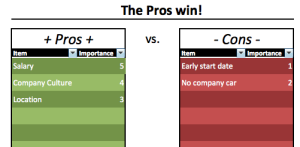There are plenty of negatives about a career fair, if you don’t know how to stand out at one.
Long lines can test even the most patient person’s patience. Being evaluated based on your resume and credentials quickly leads to insecure thoughts. And the employer has all the power in these conversations.
You may question, “Should I go to career fair?”
Of course you should! Because, amidst the few negatives of a job fair, there’s one huge positive: You’re finally face to face with an employer. Hallelujah!
You no longer have to play the lottery game of an online job submission. You can stop being in the dark about if they received your application or are considering you.
You get to speak to them and go over your resume. If you’re good enough, you can be asked for an interview on the spot. That doesn’t happen from an online job board submission.
To get the most out of career fair, follow the steps below. When you prepare like this, you’ll stand out at career fair more than any other candidate.
Buy A Tailored Suit
Companies can have upwards of hundreds or thousands of applicants to choose from. That means competition is tough. It also means that the little details—like how you dress—can make the difference between job search success and failure.
I understand that you may not have needed a professional suit until now, but that’s not an excuse to show up to career fair in business casual or plain casual. You need to look sharp. Because when you dress nice, you feel good, and perform at your best.
Spend the $100 to $300 for a nice black or navy blue tailored suit. The reason you want it tailored to your body is baggy dress pants (that could pass as sweat pants from afar) don’t support the idea that you’re a professional, successful student. And too tight of pants looks like you’re posing as a rock star, not a job candidate. Same goes for your suit jacket, it needs to fit your unique build.
A suit isn’t a costly investment if you consider how much use you’ll get out of it when you’re working in the real world. You can wear this suit during your day job, at weddings, and other formal events. Realizing this makes the high sticker price easier to swallow if your parents won’t pay for it.
Research The Visiting Companies
That suit you just bought may be a waste of money if you don’t do some basic research before the big day. Research is key to standing out at a career fair.
If you don’t know what the company does, how are you going to have an intelligent conversation with a recruiter? If you’re not willing to research the companies coming to career fair, expect to have some awkward conversations. Awkward conversations don’t lead to interviews and job offers, clearly.
To impress, look online for the list of companies attending career fair. Narrow down your top 5 to 10 choices. And then start Google searching what the company does, its mission statement, and the responsibilities of the job you want.
All the information you gather will be useful in helping you decide what job is best for you and navigating conversations with recruiters.
Plus, the more you research do before career fair means less you need to do for your job interviews.
Attend Information Nights
It’s a big advantage for the students who put in the extra 30 to 60 minutes attending a company’s information night. If you’re not familiar, an info night looks like this.
If the official career fair day for your university is on Wednesday, many companies will have an information night on Monday or Tuesday where they rent out a classroom. There, they’ll share more about the company, the open positions, the job responsibilities of each, and what they look for in applicants.
That information is helpful in its own right. And here’s the secret to going to these info nights, you get to make conversation with recruiters and hiring managers at the end. When you show a genuine intrigue in their company, they’ll remember you.
Then guess what applicants are the frontrunners for securing interviews and make the best impression at career fair? You guessed it, the ones who you already built rapport at the info night.
I received emails about most employer info nights, so stay up to date on your email inbox. If I were you, I’d also check your career services website or visit them in person to get the scoop on what companies are putting these info nights on.
Craft The Golden Resume
Though the most important aspect to winning job offers is how you interview, to get interviews your resume needs to be persuasive. That’s why bringing a top-notch resume to career fair is a must.
For whatever reasons, students will throw all of their experiences on a paper and call it a resume. They don’t have any strategy behind it. And then they blast it out to as many companies as possible. These same students struggle to an interview, yet alone a job offer.
You can do that with your resume, too. Or you can make your life easier by ordering my bestselling book The Golden Resume. My book will show you how to follow the exact resume and interview strategies to land any job offer your heart desires.
This book is so great because it takes you through the psychology behind the job search, then gives you tangible action steps to be the best applicant possible.
Related: 10 Common Resume Mistakes And What To Do Instead and Best Resume Format Guide For Your Job Search
Bring A Portfolio
Hey students without a portfolio, I have two questions. How are you going to carry the resumes you bring to career fair? And how are you going to collect important business cards and papers you collect without a portfolio?
Please don’t say in your hand. You’ll look like a disheveled mess with your hands full when you speak with companies. Even if you’re not flustered, you’ll give the appearance that you are if you’re carrying a bunch of resumes, business cards, and random papers in your hand. Trust me, it’s a bad look.
You can get a portfolio from Amazon or your campus bookstore for $15 to $30. Once you purchase this, it’s another thing you don’t need to worry about during the big day.
Pre-career fair preparation is complete and now it’s time to execute like a boss.
Show Up Right When It Starts
This is actually a huge detail, so please pay attention. You must show up right when career fair begins. There are no ifs, ands, or buts about it.
Why? Because students who show up near the end risk everything.
Being late could mean all the company’s interview slots are full. It could mean the employers are tired after a long day of speaking to hundreds of students, so they don’t give you their full attention. Or you run out of time to meet with your favorite companies.
All of these issues are avoided when you show up from the beginning. Showing up at the start also gives you ample time to practice introducing yourself to companies before you visit your favorite ones.
If you have a class during career fair, ask a week in advance to miss it for career fair. Your professors should be cool with it. If they aren’t ok with it, I’d probably skip class to show up for the beginning. Time management is a must here.
Introduce Yourself With Confidence
“Hey, uhh, I’m a junior English major. Oh yeah, sorry. My name is Brian Robben. Um, what do you guys do,” is the worst introduction you can make. Are you kidding me? But I’ve heard students do it.
Although the introduction isn’t a big deal on its own, it is if you flunk it. You need to bring your A-game to this career fair and how you introduce yourself sets the tone. Since first impressions matter when you introduce yourself to a cute guy or girl, they also matter here.
Just keep it simple by saying your name, grade level, major, and an insightful comment about the company you’re talking to. An insightful comment could look like this:
- I was so excited when I saw you guys were coming to this career fair.
- Congratulations on winning the “insert award name.” (based on your research)
- One of my favorite things about your company is “insert favorite thing.” (based on your research)
Your comment makes it clear that you’re prepared and it makes a smooth transition for the employee to talk about.
Practice is the best medicine for nervousness. So practice everything leading up to career fair, including your introductions, until you get it down.
And if you’re still not confident when you arrive at career fair, just act like it. Companies won’t know the difference. Research shows acting confident can immediately translate to real results in social settings. That whole “fake it ‘til you make it” talk is right on the money.
Practice On Unimportant Companies First
I get that you’ve targeted the companies you want to visit based on your research. But don’t blast through the career fair doors and make a beeline to your top companies right off the bat.
What if you let your nerves get the best of you and shoot yourself in the foot at the company you want to work for most? You only have one shot at each company.
So it only makes sense to protect yourself from that mistake by visiting the less important companies first to introduce yourself. By unimportant, I mean companies that are not in the field you want to work in or organizations you would never want to work for.
After you visit a few companies, you’ll be way more comfortable than when you started out.
You’ll also pick up key insights during these practice rounds, like what past experiences are most interesting to them, what to say and not say, and how to inquire about future steps in their hiring process.
With a few practice conversations with recruiters under your belt, it’s time to make your best impression at your top companies.
Visit Your Favorite Companies
Everything else has led up to this moment. It’s time to shine! Visit your favorite companies with a big smile and confidence.
If there’s a long line before you can get in front of their table, don’t let that get to your head. Have faith that you want it more than other people and you’re going to prepare for the interview harder than them. The line could be 100 or 1,000 people, and you’re still going to come out on top. This mentality will help you put your best foot forward with the recruiter and stay focused.
I also find it helpful to be authentic to recruiters by saying that their company is one of your top choices. It makes the recruiter feel special, while also sending the message that you’re extremely interested in the position.
And companies hate spending time interviewing applicants only to find out they aren’t that interested in the job or the company. You immediately alleviate that thought in their head by expressing your intentions. That understanding helps secure interviews.
Collect Contact Info
You could trust that recruiters are going to take your resume and reach out to you about the next steps. Or you could, and should, get their contact information.
Before you leave their table, ask the person you’re speaking with for a business card. Or if they don’t have one, ask for their contact information so you can write it in your portfolio before you visit the next booth.
You’ll need it for the next step—sending follow up emails. And it’s nice to have even if you don’t get the job, so you can reach out next semester about another opportunity.
Send Follow Up Emails
There’s a reason you write down names of recruiters above, and it’s for this step. Send a friendly follow up email to thank them for their time and express your interest in the job.
Just because they said they’ll get back to you with the next steps doesn’t mean you can’t show your interest in the position. Just don’t go too far and bug them with more than one call or email.
You don’t need to do this and most candidates don’t follow up. That’s exactly why this email will help you stand out with employers.
(Bonus) Ace Interviews
(Yes, I know you can’t ace interviews at career fair. But, I didn’t want to help you get job interviews and leave you hanging unprepared for them. So here’s a bonus tip.)
You didn’t do all this career fair work to get a bunch of interviews and not come away with great job offers. That would be nothing but a disappointment and waste of time. Ain’t nobody got time for that!
You went to career fair to be the master of your destiny and find your dream internship or job. By now you’ve set up a bunch of interviews.
So are you ready to take the final step to ace these interviews?
Learn how to master your interviews with this article—Perfect Answers To Behavioral Interview Questions—and my book The Golden Resume. You’re so close to reaching your goal!
The job search can be a gauntlet, though that’s what makes getting job offers so rewarding. Nothing came easy and you had to go get it, and you did.
Final Words
Sure, it would be nicer if you could set up a desk at your place and have all the employers line up to speak with you. But that’s not how the system works.
So look at the positive that you have all of these employers looking for a great candidate, like yourself, and make the most of career fair. Use this event to learn more about companies. Get answers about what they’re looking for in a candidate and the next steps. And then win that job offer.
A career fair is far better than the alternative of an ambiguous online job search.
Image credits: Anita Borg Institute



